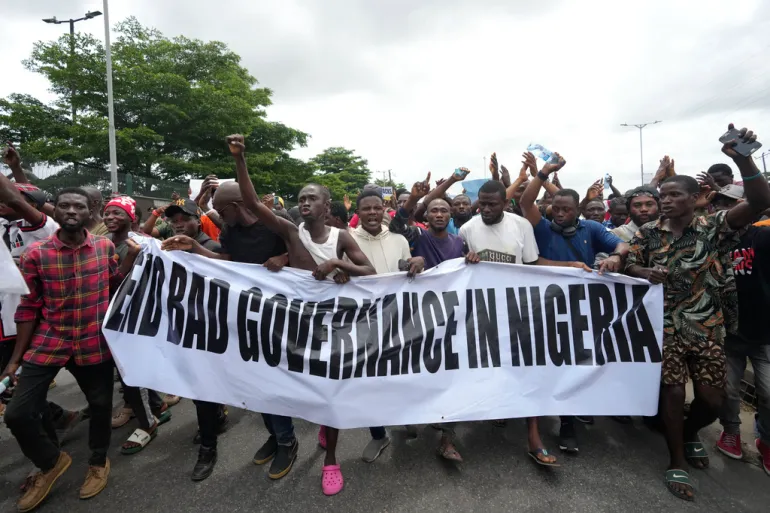
By Edu Abade
As Nigerians, especially the youth besiege the streets to express their outrage against economic hardship exacerbated by severe hunger, the single most dominant argument of the protesters is how the complete removal of subsidy on petroleum products have contributed to the crisis country.
Most of the protesters in Rivers, Bayelsa and Delta states complained about how they have resorted to fuel wood for cooking as a result of the high cost of kerosene and gas. They also lamented that cutting of trees for charcoal has been the only option for them despite its contribution to soil degradation and vulnerability to climate change.
One of the over 100 protesters sighted near PTI road in Effurun near Warri, Benson Omonigho, told journalNG that in his Okuokoko Community there are no more trees to cut down for fuel wood anymore as the poor community members resorted to fuel wood when other products skyrocketed along with the increase in the pump price of fuel announced in June 2023.
But that is not the only issues in the Niger Delta. Oil host communities are also relegated in the provision of basic necessities like electricity, pipe-borne water, accessible education and health care in spite of the huge amounts of money accruing to oil producing states (running into trillions of Naira) from 13 percent derivation and other sundry sources of income, have contributed to the general angst in the land.
A Delta-based activist, John Osiene argued that the protest is the only way that the locals can bring their plight to the limelight, lamenting: “Imagine a situation where the average family cannot afford cooking gas or kerosene and resort to cutting trees to cook, will it not affect the ecosystem and increase temperature?
A public affairs analyst, Omamuzo Oletu, argued that “whatever is manifesting today as protests across the country is inherited pent up feelings of Nigerians across board on government failure to address the crucial matters of survival and well being of the people. It did not just start last year when President Bola Ahmed Tinubu took over as President.
“The truth is that things were already tough under former President Muhammadu Buhari, but things only got tougher when Tinubu came in and Nigerians were expecting some respite from the failures of the immediate past government. President Tinubu also failed to come to terms with the reality on ground before announcing total removal of subsidy from petroleum products on the first day of his administration and that is what has brought us to this point.”
Speaking on the stark reality in the country, a former Politics Editor of The Guardian Newspaper, Anote Ajeluorou, maintained that there is a strong correlation between subsidy removal and the hardship Nigerians were now passing through.
He said: “Of course there has to be and one of the demands of the protesters is the reversal of fuel subsidy President Tinubu hastily removed last May to please the International Monetary Fund (IMF) and the World Bank, so he could get loans from the Bretton Wood Institutions to fund his expensive and bloated government. It was not just subsidy removal of petroleum products, so to say.”
He said the President compounded the problem by the floating of the Naira not minding that Nigeria imports fuel for domestic use in dollars, stressing that something was apt to give and escalating high cost of fuel with imports as local refineries continue to remain dysfunctional.
In his words: “The fear of protests, public outcry and Aliko Dangote donning a belligerent stance in exposing the economic saboteurs in the oil sector, however, forced President Tinubu to order the Nigerian National Petroleum Company Limited (NNPCL) to sell crude oil to his new refinery in naira instead of dollars.
“The move, if carried out to the letter, could alter the situation for the better for Nigeria. But we wait to see how this arrangement goes, as promises often turn to hopelessness in Nigeria.”
On how the energy crisis has personally affected him and his family, he said: “I travel a lot, so high costs of fuel means high cost of transport fares, whether by road or by air. I coughed out a N340,000 return ticket from Lagos to Benin City on June 14, 2024.
“That was crazy for a trip that should have cost only N60,000 a few years ago. So, it’s bound to affect me. But as a Nigerian, you have to find ways to navigate the situation. We are adaptive people who are specialists at navigating intractably complex situations. That’s why we survive in foreign lands easily, because our rulers take pleasure in making life hellish for their citizens.
“And it’s precisely why our young ones are protesting, because with the internet they see and know what their counterparts overseas take for granted that rulers deny them back home.
Also speaking, National President of the Commerce and Industry Correspondents of Nigeria (CICAN), Charles Okonji, insisted that there is a strong link between the energy crisis, fuel subsidy removal, general increase in price and the ongoing protests.
“First, it took just one careless policy statement to destroy the entire economy in less than one day. Like the President told Nigerians and the whole world that there was nothing like subsidy, it wouldn’t have created problems when removed, but the reality is that the first thing was not done before the pronouncement.
“The President ought to have been properly sworn in, assembled his cabinet, then brain-stormed and put palliatives in place before making the pronouncement. He acted too hastily in removing the subsidy, thereby throwing the entire economy into chaos.
”
Removal of fuel subsidy escalated the pump price of Premium Motor Spirit (PMS), which caused a ripple in the already collapsed economy. This is because the business cycle has been altered. Don’t forget that this affected the local consumption of energy. PMS is a major determining factor for prices of commodities as fuel is used for vehicles, generators and for transportation of goods and services, which is transferred to the consumers.
“Moreover, the alteration in the normal business cycle triggered loss of profit, reduction in available disposable income, inventory pile-up, loss of jobs, capacity under-utilization, mass exodus of companies to neighboring countries, aggravation of insecurity, banditry and all manner of social vices.
“The subsidy removal forced majority of manufacturers and micro, small and medium businesses (MSMEs) to close shops, while others exited the county as they could no longer afford operational costs, thereby throwing more people into frustration. In all, the ripple effect of subsidy removal is the whole essence of the EndBadGovernance protests.”
Although President Tibunu in his nationwide broadcast has assured Nigerians that his administration will address the issues and demands of the protesters, majority of the citizens are taking his words with a pinch of salt, insisting that if the presidency had acted earlier, the violence and wanton destruction of life and property that greeted the protests would have been averted.











